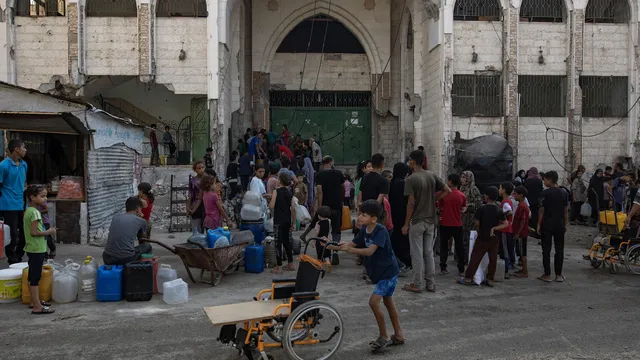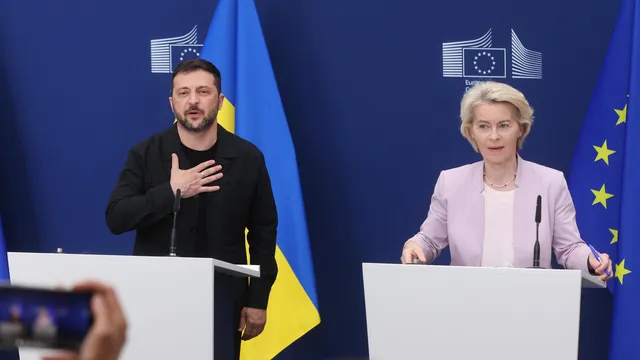More than 65,000 Palestinians have been killed, at least 21,000 children have been left with permanent disabilities, and the entire population is trapped under bombardment, starvation, and blockade.
The military operations that followed the attack by the terrorist organization Hamas against Israel on October 7 have now been going on for almost two years. On that day, 1,219 people, mostly civilians, were killed and another 251 were kidnapped in Gaza.
According to reports, 47 hostages are still being held captive, 25 of whom are believed to be dead. The fate of those still in Gaza has become Israel's main justification for continuing its military campaign, despite the increasing destruction across the territory.
But at what point does the end justify the means?
The human cost is enormous. The UN Committee on the Rights of Persons with Disabilities recently reported that since the start of the war, nearly 40,500 children have been injured, with more than half of them left with permanent disabilities.
Humanitarian aid continues to be systematically blocked, with Israel even classifying wheelchairs and prosthetic limbs as "dual-use items" and therefore refusing to allow them into the territory.
The UN has already declared a famine in Gaza – the first in the Middle East. Half a million people are facing a "catastrophic" food shortage, with over 98% of arable land destroyed and access to clean water and healthcare completely collapsed.
UN officials have stated clearly: "Creating artificial famine for military purposes is a war crime."
Israel denies the existence of famine, dismissing the evidence as "lies orchestrated by Hamas".
Genocide not only kills civilians, but also silences those who can document it. According to Reporters Without Borders (RSF), at least 220 journalists have been killed since the start of the war in Gaza, which is a completely unprecedented number.
In coordinated strikes, the Israeli army has repeatedly attacked Palestinian reporters, creating the risk that soon "there will be no one left to tell the story of the horrors of the war."
Hundreds of media outlets around the world have joined RSF in protest, calling for international pressure to end Israel's impunity.
On March 19, 2025, Captain Marin Marinov, a 51-year-old Bulgarian citizen working for the United Nations Office for Project Services (UNOPS), was killed in Gaza when an Israeli tank fired on a UN guest house in Deir al-Balah.
Nine other people were wounded in the attack, including six international staff members.
Initially, the Israeli Defense Forces (IDF) denied responsibility, but later admitted that the building had been misidentified due to suspected enemy presence.
The UN condemned the incident as a violation of international law, and Bulgaria launched a pre-trial investigation into the killing of a person under international protection.
While the government maintains its course, divisions are growing in Israel.
Former general and politician Yair Golan was convicted after stating that "a normal country does not kill babies for fun."
His comments, in which he compared Israel's global trajectory to apartheid in South Africa, sparked outrage from both the government and the opposition.
The International Court of Justice in The Hague is currently hearing a case brought by Pretoria alleging that Israeli forces are committing genocide against Palestinians in Gaza.
At the same time, hundreds of Israelis took to the streets with sacks of flour and photos of starving children, demanding an end to "starvation as policy." According to reports, the scarce food available in Gaza is extremely expensive—a sack of flour can cost up to $60.
Protest leaders openly accuse their own country of committing war crimes.
International recognition of genocide is growing. Yesterday, European Commission Vice President Teresa Ribera broke precedent by calling Israel's war in Gaza "genocide," highlighting the EU's inability to take a firm stance or even speak with one voice.
"The genocide in Gaza exposes Europe's inability to act," she said, as divisions within the bloc block meaningful action.
Meanwhile, more countries continue to recognize Palestinian statehood, while others remain paralyzed between condemnation and complicity.
Since the war in Gaza broke out in October 2023, several countries have taken steps to formally recognize the Palestinian state or announced plans to do so at the upcoming UN General Assembly.
A few days ago, Belgium, citing the humanitarian crisis in Gaza and Israel's actions in violation of international law, announced that it would recognize Palestine and impose sanctions on the Israeli government.
France, Canada, and the United Kingdom have also committed to recognizing Palestine, and Australia recently joined the list. Other countries such as Malta, Finland, and Portugal are likely to follow suit.
Overall, at least 145 of the 193 UN members already recognize or plan to recognize Palestine, reflecting growing global pressure to affirm Palestinian sovereignty in the context of war. Bulgaria did so as early as 1988.
UN Secretary-General António Guterres himself warned that hunger and mass killings cannot continue "with impunity."
This devastation fits in with Donald Trump's surreal vision, whose aides have drawn up a plan to relocate the entire population of Gaza and turn the ruins into a "Middle East Riviera."
The proposal, revealed by The Washington Post, involves relocating two million Palestinians and replacing their homes with "smart cities" powered by artificial intelligence and real estate on the seafront.
Israeli Prime Minister Benjamin Netanyahu praised the idea, while human rights organizations condemn it as ethnic cleansing disguised as "redevelopment."
For 700 days, Gaza has been subjected to systematic destruction. Mass killings, artificial starvation, silencing of journalists, and raids on children and people with disabilities.
On September 4, the Israeli army announced that it now controls 40% of Gaza City, while the UN warns that one million people there are facing starvation.
The genocide is undeniable—but the world's response remains divided, silent, or openly complicit.
As hunger deepens and survivors crawl through the rubble without means of transportation, as journalists die with cameras in their hands, the question is not whether history will judge what has happened, but whether today's leaders will act before Gaza is completely wiped out. | BGNES
---
Analysis by the international department of the BGNES agency.

 Breaking news
Breaking news
 Europe
Europe
 Bulgaria
Bulgaria







